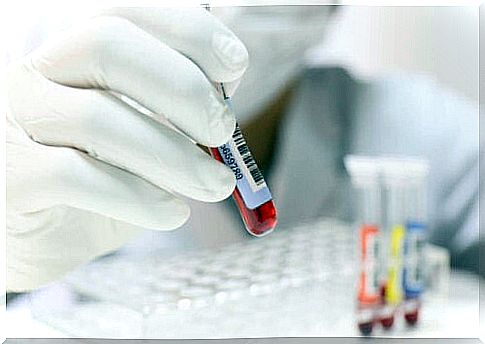How Often Should Blood Tests Be Performed?

Many feel that taking blood tests is not necessary when they are completely healthy, but it cannot always be relied upon. Blood tests are routinely requested precisely because they help to detect many creeping diseases at an early stage, so that treatment can also be started as soon as possible. How often, then, should blood tests be performed? Is it absolutely necessary? Wait and see.
There are many components in our blood that can change even before the symptoms themselves begin to appear. Indeed, routine blood tests provide a huge benefit to both preventative treatment and help avoid potential complications in the future.
When a doctor asks for routine blood tests, he or she is likely to look for signs of certain conditions that occur more often at a certain age. In addition, in cases where a patient has already been diagnosed with a chronic disease, a routine blood test will allow the attending physician to monitor the development and effectiveness of the prescribed treatment.
Blood is used as a means to identify and analyze the internal state of the body through the speed of tests and its easy availability. Laboratories are widespread medical institutes today and the usefulness of blood tests has also been scientifically proven.
How often, then, should blood tests be performed? A normal healthy person usually only needs to have routine blood tests only about once a year. For patients with chronic diseases, it is necessary to shorten this interval again, and especially in those cases where the treatment of the disease is still in its infancy.
What signs of blood tests are looking for?
When we talk about blood tests, we are referring to the performance of biochemical tests on blood tissue. As many of us certainly know, blood is the liquid tissue in our body that travels through blood vessels and arteries throughout the circulatory system. Although blood is liquid, it is made up of two different groups of components:
- Solid components: The solid components of blood are, as the name implies, a solid part of blood. From this group we can mention red blood cells (erythrocytes), white blood cells (leukocytes) and platelets (platelets). The role of red blood cells is to carry oxygen from the lungs to other tissues in the body. The function of white blood cells, on the other hand, is to defend the body against harmful bacteria and other pathogens. Platelets, on the other hand, play a significant role in the blood clotting process and thus prevent wounds from bleeding for too long.
- Liquid Components: The liquid part of the blood includes blood plasma, also known as blood serum. Most of the blood is made up specifically of this cell medium and its function is to regulate the body’s heat and fluid balance and to transport nutrients.

Some biochemical tests focus on a solid part of the blood and analyze the cells. For example, measuring the number of red blood cells helps determine how many red blood cells are present in a given amount of blood. These biochemical tests can also be used to count white blood cell and platelet counts.
The solid part of the blood and its shape can also be analyzed through a microscope. Through this, it can be seen whether the red blood cells are small or large, whether they have deformities or other limitations that indicate the possible presence of a disease.
An almost limitless number of different parameters can be found for measuring and analyzing the blood serum or liquid portion. The most common of these parameters (and at the same time the traditional routine measurement) is the measurement of the concentration of sugar, creatinine, urea, uric acid and lipids in the blood plasma. In addition, concentrations of ions such as sodium, magnesium and potassium can be measured in the liquid part of the blood.
Blood tests can also provide the patient with information about the body’s hormone levels. For example, it is common for a doctor to request thyroid tests in cases where it is desired to analyze the amount of hormones produced by the thyroid gland.
And just as important are the serologies that the laboratory uses to detect various infectious diseases or indirectly present in the blood in the blood that indicate the presence of that disease.
At what age and how often should blood tests be performed?
Medicine has succeeded in determining certain routine blood tests that each of us should always have commissioned at a certain stage in life. In this sense, the physician guides the patient to the biochemical tests that best suit the patient’s age and state of health.
The following protocols are set both globally and nationally based on the most common diseases that occur most in each age group. It can be assumed that these blood tests will enable physicians to detect in a timely manner at least most of the diseases and disorders that will sooner or later lead to death or otherwise impair a patient’s quality of life.
Young adults aged 20-35 years
Although it is normal at this age that the incidence of disease is generally lower, annual screening is necessary to prevent future complications. It should be emphasized at this stage that diseases or other disorders detected at an early stage are always easier to treat.
Blood tests for this age group include a blood count (to help measure the status of blood cells called white blood cells, red blood cells and platelets), parameters related to kidney function, liver status and blood sugar and cholesterol (good and bad cholesterol and triglycerides).
Pregnant women
During pregnancy, a woman’s body goes through several different changes. In other words, this is a very special situation, the monitoring of which requires blood tests to be performed both in the early stages of pregnancy and regularly during pregnancy.
It is normal for the attending physician to order blood tests on a pregnant woman at least every three months. In addition to the normal state of health of the mother and fetus, these blood tests measure the presence of infections that may affect the fetus, such as toxoplasmosis, syphilis, hepatitis B and HIV (AIDS).
Adults aged 35-55 years
Routine surveillance in this age group needs to be further intensified, as the incidence of many chronic diseases in the population will increase around the age of 40. Indeed, blood tests in this age group are combined with many different imaging tests, such as mammography for breast cancer; pathological anatomical examinations, such as a gynecological loose cell sample for screening for cervical cancer, i.e., a pap test ; as well as invasive tests such as colonoscopy.
In addition, doctors tend to add blood tests that reveal hormonal changes to the above tests, especially in middle-aged women whose menopause is about to begin.
From the age of 60 onwards
The incidence of various diseases is much higher among the elderly compared to other age groups. In addition, many people over the age of 60 already have a chronic illness, and in these cases they have to go for blood tests before a year has passed since the previous test.

As we have seen, how often blood tests should be performed depends a lot on what age group the patient belongs to and whether they have already been diagnosed with a disease that requires medical attention. Blood tests also help determine if a patient is at risk for one of the diseases that are most common in that age group.
Finally
Contrary to many of us’s beliefs, taking blood tests is also part of monitoring the health of a healthy person. In addition, in cases where the person in question suffers from a particular disease, commissioning regular biochemical tests is even more important, as routine blood tests can in many cases prevent disease progression and deterioration.
By referring you to a doctor ’s office, you will help your doctor prescribe the right blood tests for you according to your age and physical condition. In addition, you should keep in mind that regular blood tests can also help detect some serious illnesses in a timely manner, which can also help you avoid irreversible changes to your health in the future.









